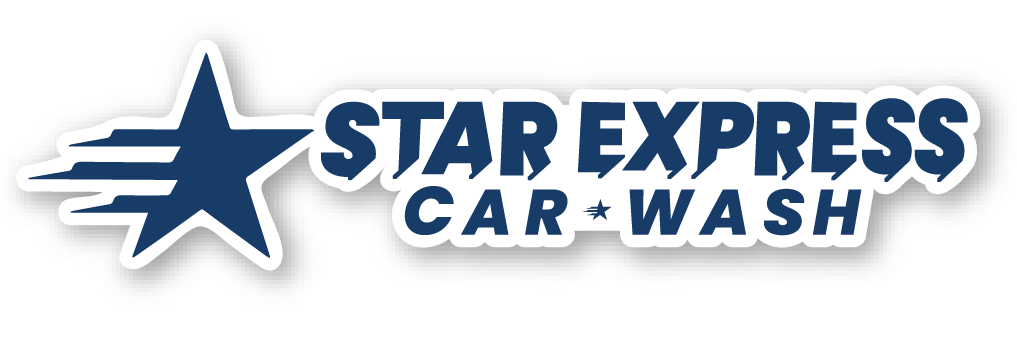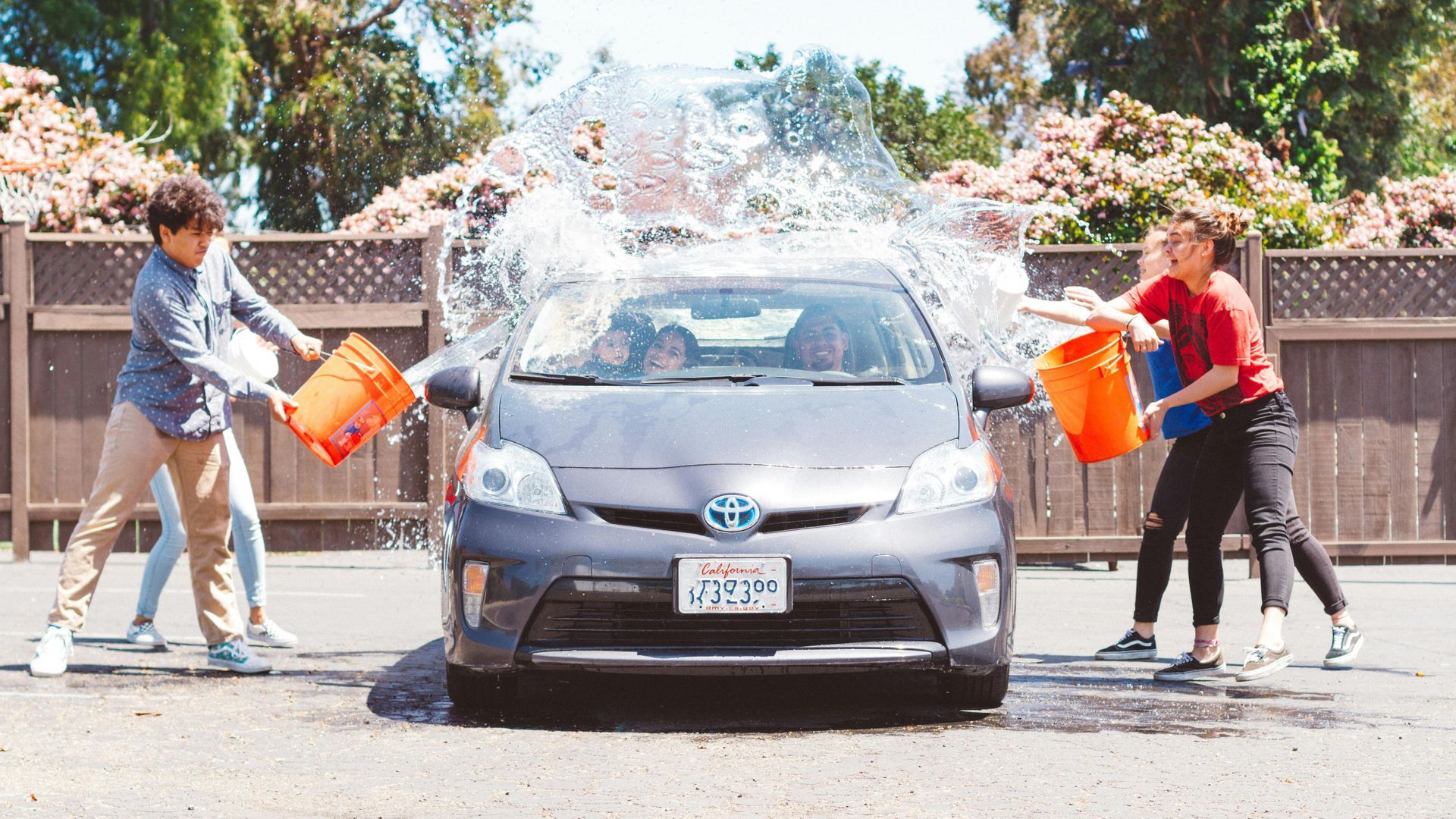
BETTER FOR THE ENVIRONMENT

THE DIRTY LITTLE SECRET
OF HOME CAR WASHING
Most car washing is being done at home with a hose and a bucket of soap in the driveway, but washing vehicles in driveways or parking lots create polluted wastewater. When allowed to run freely down the driveway into the gutters, the water mixes with soaps, road acids, brake dust and other harmful contaminants. This polluted wastewater empties straight into the storm drain and straight into our community wetlands, rivers, lakes, and oceans.
PROFESSIONAL CAR WASHING OFFERS AN IDEAL ALTERNATIVE
There is a myth believed by the public that professional car washers are water wasters and not the most environmentally friendly. This myth holds no water. Professional car washes are equipped with high-pressure, low flow nozzles that precisely control the amount of water used on a car and numerous studies indicate professional car washers use LESS water than home washing and DO NOT contributing to storm water pollution. The majority of consumers are unaware that many professional carwashes recycle their water and reuse it multiple times in the carwash process and also treat the wastewater prior to releasing into the SEWER system.
HOW STAR EXPRESS
CARES FOR THE ENVIRONMENT
At Star Express Car Wash, we use state-of-the-art technology to minimize our impact on the environment. The water we use is first filtered then flows to the sewer for treatment and processing before being released into the environment.
Our computer controls minimize the waste of any water so you can get a clean shiny car knowing it used only a fraction of the water used when washing by hand.
Our soap and energy efficient practices reduce the environmental impact of getting a clean car.
Why is washing at Star Express so good for the environment?
WATER USE. Star Express uses a fraction of the water that home washers use. In fact, home washers can use up to 140 gallons of water while washing at Star Express Car Wash only uses approximately 35 gallons of fresh water per car.
RECYCLED WATER. Star Express Car Wash reclaims and filters almost all of its fresh water for potential re-use. This recycling allows Star Express to save about 20 gallons of fresh water for each wash.
WATER TREATMENT. Water that is not re-used is discharged into the local sanitary treatment facilities where it is properly processed before being released back into our areas rivers and streams.
COMPUTER CONTROLS. Star Express uses state of the art computer controllers that precisely time each water application according the exact length of your car. This ensures that no additional water is used than is absolutely necessary.
SAFE CHEMISTRY. Star Express is proud to use Qual Chem vehicle washing products all of which are non-acidic, non-caustic, non corrosive and biodegradable. This choice was critical to Star Express Car Wash and means that you, your vehicle, and the environment are not exposed to any harmful chemicals.
PRECISION NOZZLES.
Through the use of finely engineered stainless steel and brass nozzles, Star Express Car Wash is able to select exactly the correct amount of water or chemical to be used during the wash process. Like the computer controls that are used, this ensures a limited amount of waste.
CENTRAL COLLECTION. Think of Star Express Car Wash as a central collection facility for all the dirt and grime that collects on the community's cars. As such, the dirt and grime is collected and then re-directed to facilities that can properly handle this non-hazardous waste.

CAR WASHING AT HOME
Conducted by the Federal Way Surface Water Management Division, the Residential Car Washwater Monitoring Study illustrates the connection between residential car washing, storm water, local surface waters and the Puget Sound. For years, environmentalists have told the public that washing cars in the driveway is detrimental to local waterways, and now Federal Way city staff has the numbers to prove it.
WASTES WATER. Engineering studies have shown that a 5/8" hose running at 50psi uses 14 gallons of water per minute. As many as 140 gallons of water could be used in a ten minute home car wash, most of it wasted.
POLLUTES STORM DRAINS. Washing at home sends all the corrosive and toxic substances that are on your vehicle and on the street, including asphalt, engine and brake residue, antifreeze, grease, oil, rust and asbestos into the storm drain system. Storm drains are designed to handle rainwater and thus the water is not subject to any pretreatment before being released into our areas rivers and streams.
CLOGS STORM DRAINS. As previously mentioned, storm drains were designed to handle rainwater. When car washing is done at home the dirt and grime is carried into the storm drains which can clog them from working most efficiently during our rainy season.
HARMS WILDLIFE. Even if bio-friendly soap (or no soap at all) is used, hosing off a car's body and wheels dislodges pollutants that can end up in rivers, lakes, and streams. In a 2006 study it was shown that these chemicals when released into our areas rivers and streams can damage fish's mucus membranes and gills and wash away natural oils that help them absorb oxygen and ultimately lead to the loss of the fish.
WATER TREATMENT
STAR EXPRESS VS. AT HOME
STAR EXPRESS
- At Star Express Car Wash, all fresh water used is collected in reclaim tanks and held for potential re-use.
- When re-used, water is processed through a series of filtering systems and then pumped into the early stages of the wash process where it is not necessary to use fresh water.
- The reclaim tank has an overflow pipe and water that is not re-used is diverted to the municipal's sewer system.
- This system treats the water and "cleans" it prior to sending it back into our areas rivers and streams thus not endangering any wildlife.
AT HOME
- The storm drainage system is a network of ditches, culverts, pipes, and access structures that work together to direct the flow of stormwater in a city.
- Stormwater that falls on streets and buildings is channeled into the storm drain system that redirects the flow to local waterways.
- When washing your vehicle at home water and chemicals that enter the storm drain system flow to the local waterways without being pre-treated.
- There are no detergents of any kind that are approved for discharge into storm sewers.
- Professional car washes are outlawed by the Federal Clean Water Act to discharge their waste water into the storm drain system and instead divert their waste into the sanitary sewer system.
DON'T JUST TAKE OUR WORD FOR IT:
Click the links below for more information on home car washing effects on the environment.

THE PROBLEM WITH TYPICAL
CHARITY CAR WASHES

Holding a car wash is a popular way to raise funds for various organizations but all too often, while they may help the organization, such car washes hurt the environment. That's because these washes are often held in public parking lots that drain into the storm water system, which leads directly into our areas rivers and streams. Soap suds, oil, grease, and other contaminants are washing into the curb and end up polluting local waterways. Putting these material into the stormdrain is the same as dumping them directly into nearby streams. Dirt, grime, oil, soap, and other car wash residuals are harmful to fish, wildlife, and plants that grow in and around waterways. Even biodegradable soap causes trouble because when it enters a waterway and begins to degrade, it uses up oxygen needed by fish, plants and other marine life.
Not only is this type of fundraiser environmentally unfriendly, but it is also illegal. The U.S. Environmental Protection Agency passed the Clean Water Act in 1972. Phase 2 of this act went into effect December 8th, 1999. This phase makes it illegal for anyone to put anything in local storm drains except rain water.
THE SOLUTION:
Does this mean that local non-profits can no longer use car washing as a means to raise well needed funds? No. Star Express Car Wash has developed a very successful fundraising program that any qualifying non-profit organization can use to raise funds. The Star Express program has proven to be more successful and safer than traditional corner parking lot washes. And most importantly, the Star Express program is environmentally friendly and will not harm our local waterways.
BEST OF BOTH WORLDS
Not only do we believe in protecting the Earth, we also protect your vehicles. Star Express Car Wash selects the best detergents for the environment and to give you the deepest clean possible. Click below to see how we chose the best processes to take care of your finish.


